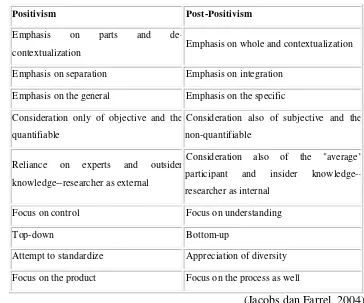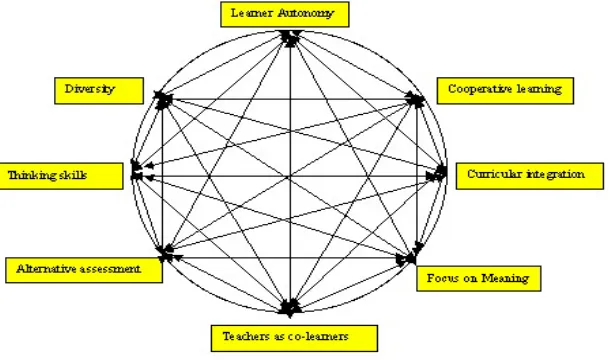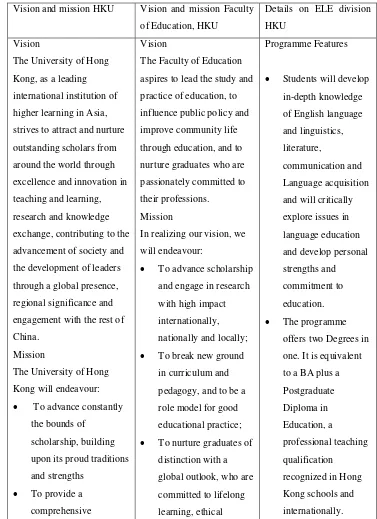REGISTER, Vol. 8, No. 1, June 2015 19
Teaching and Learning English Paradigm and The Implementation of The Policy
Zainal Arifin IAIN Surakarta arizain@gmail.com
Abstract
20 REGISTER, Vol. 8, No. 1, June 2015
lecturers called learning paradigm, although the method is not covered by the policy. The difference between Paradigm and policy in both universities is influenced by the context of the political situation, especially the rules of ministry of higher education, cultural context and the orientation on each university.
Keywords: Paradigm Shift, Academic Policy, English Language Education, Intertextual Analysis
Abstrak
Teori Pengajaran Bahasa Inggris saat ini sedang mengalami pergeseran paradigma. Pergeseran paradigma ini terjadi karena peninjauan kembali dasar-dasar linguistik dan pedagogis serta penilaian ulang dampak sosiolinguistik bahasa Inggris dalam setting yang semakin mengglobal. Artikel ini bertujuan untuk melaporkan hasil penelitian perbandingan tekstual tentang paradigma pengajaran dan pembelajaran bahasa Inggris dan kebijakan yang dimiliki dua jurusan Pendidikan Bahasa Inggris di dua perguruan tinngi yaitu di Hong Kong University (HKU) dan di IAIN Surakarta. Tujuan penelitian tersebut adalah mendeskripsikan perbandingan paradigma pendidikan bahasa Inggris dan kebijakan akademik di kedua perguruan tinggi tersebut. Desain penelitian ini adalah deskriptif kualitatif dalam bentuk analisis intertekstual. Data diambil melalui analisis dokumen dan wawancara dengan sivitas akademika kedua perguruan tinggi dan dianalisis dengan teori pergeseran paradigma pembelajaran bahasa Inggris (Kostoulas, 2010) dan kebijakan akademik (Kantor Jaminan Mutu UGM, 2012) menggunakan interaktif modelnya Miles and Huberman. Keabsahan data menggunakan trianggulasi metode dan sumber data. Hasil penelitian menunjukkan konten pendidikan bahasa Inggris yang diajarkan di Division of English Language Education (ELE) HKU dan di Jurusan Pendidikan Bahasa Inggris (PBI) IAIN Surakarta relatif sama namun cara dan alasan memberikan materi pendidikan bahasa Inggris relatif berbeda. Paradigma dan kebijakan akademik di ELE HKU
sudah menganut lerning paradigm sedangkan PBI IAIN Surakarta masih menganut teaching paradigm walaupun saat penelitian ini dilakukan gejala untuk menuju pergeseran paradigma sudah mulai terjadi di beberapa unsur akademik misalnya dalam penggunaan metode bersifat learning
paradigm oleh dosen walaupun belum dipayungi oleh kebijakan yang
REGISTER, Vol. 8, No. 1, June 2015 21 yang berkuasa, konteks budaya dan oientasi masing masing perguruan tinngi.
Kata kunci: Pergeseran Paradigma, Kebijakan Akademik, Pendidikan Bahasa Inggris, Analisis Intertekstual
Introduction
At present, ELT theory appears to be undergoing a paradigm shift
which is sustained by a rethinking of its linguistic and pedagogical
underpinnings, as well as by a re-appraisal of the sociolinguistic impact
of the English language in an increasingly globalized setting (Kostoulas,
2010).
This paradigm shift is also the impact of educational paradigm shift
in general that has occurred since the 1950s (Hill, 1999). A paradigm shift
is happening slowly but surely. Pergeseran is needed in addition is also
desirable (Barr and Tagg, 1995). This fundamental change would have an
impact on academic policy changes related to the implementation of
teaching and learning in the English Department, especially English as a
second or foreign language.
According to the Standards for Foreign Language Learning:
Preparing for the 21st Century, language and communication are the heart
of the human experience. The quote is a philosophical statement in the
foreign language learning in the United States. Regarding with this
philosophical statement, there are five simple words that reflect the
philosophy of foreign language education adopted to face the 21st century.
22 REGISTER, Vol. 8, No. 1, June 2015 communities. These five words are mutually integrated in the
implementation.
Nowadays, ELT is in a transition between two different informing
paradigms (Figure 2.1). The dominant paradigm derives its linguistic and
pedagogical legitimacy from norms developed in the Anglophone West,
and is associated with linguistic hegemony. On the other hand, the
emerging paradigm espouses linguistic and pedagogical norms which are
bounded by local circumstance, and the position itself critically towards the
political implications of ELT. The interaction between these two paradigms
seems to generate tension at the points where they interface, namely the
questions of which language variety (what) to teach, through which
methods (how) and to what end (why) (Kostoulas, 2010)
Figure1. Emerging VS Dominant Paradigm Paradigm (Kostoulas
REGISTER, Vol. 8, No. 1, June 2015 23 In details the differences both paradigam in learning English as a
second language can be seen on the table 1 below;
Table 1. Contrasts between positivism and post-positivism
Positivism Post-Positivism
Emphasis on parts and
de-contextualization Emphasis on whole and contextualization
Emphasis on separation Emphasis on integration Emphasis on the general Emphasis on the specific
Consideration only of objective and the quantifiable
Consideration also of subjective and the non-quantifiable
Reliance on experts and outsider knowledge--researcher as external
Consideration also of the "average" participant and insider knowledge--researcher as internal
Focus on control Focus on understanding
Top-down Bottom-up
Attempt to standardize Appreciation of diversity
Focus on the product Focus on the process as well
24 REGISTER, Vol. 8, No. 1, June 2015 In general there are eight major changes in learning Second
Language Education associated with this shift. These eight changes are
Learner autonomy, Cooperative Learning, Curricular integration, Focus on
meaning, Diversity, Thinking skills, Alternative assessment, Teachers as
co-learners. Figure 1.1 illustrates the interdependence of these eight
changes of the paradigm shift in second language education. The circular
nature of the figure emphasizes that all the changes are parts of a whole
and the successful implementation of one change depends on the others.
Figure 1.1. Eight Changes in Second Language Teaching ((Jacobs
dan Farrel, 2004)
Academic policy is also one of the ways to see the paradigm shift
as the implementation of second language education paradigm in an
institution. In this regard, the Center for Quality Assurance / Kantor
Jaminan Mutu, UGM (2012) states that academic policy is a policy
REGISTER, Vol. 8, No. 1, June 2015 25 policy is released in both university level/ institute and the faculty level.
Academic policy of UGM include:
1. Education services division includes the Mission and Purpose, Program,
Resources, Evaluation of program and institutional affairs.
2. Research services division covers Mission and Objectives, Research
Program, Resources, Evaluations of Program and institutional affairs
3. The Community Services division includes the Mission and Objectives,
Program, Resources, Evaluation of program and institutional affairs.
4. Principles of Operation.
Academic policy is described by standardized academic affair and
is implemented based on the academic regulation. Academic Regulation is
a software system for the implementation of the academic education that
will be implemented to the whole academic community in which each
community has a set of Specific study program.
Specific study program is a brief description of the study program
that functions to communicate between the students and the stakeholders.
Specific study program indicates explicitly the desired results of the
learning process. It helps students to understand: teaching and evaluation
methods used. It makes a link between a program organized and
professional qualifications as the output of graduates as well as its influence
on their career level. it helps students in determining the courses will be
taken. It is not only as a label of university and as an institution’s
responsibility to the public, but also to provide stimulus to the faculties to
understand and to implement the educational goals and learning outcomes
of the program being organized.
Based on the theoretical descriptions above, the researcher aims to
26 REGISTER, Vol. 8, No. 1, June 2015 Language Education has been conducted in ELE HKU and PBI IAIN
Surakarta. The followings are the results and discussions.
Research Methods
Descriptive Qualitative is used in this study specifically in the form
of textual analysis. Two Universities are the Setting of the study. They are
the Division of English Language Education (ELE) Hong Kong University
and the English Language Education Department IAIN Surakarta. The data
collected in this study are in the form of words about paradigms and
academic policy in both universities. The researcher collected the data from
the documents and informants in both universities. The instruments used to
collect the data are document analysis and interviews. Data were analyzed
using the Miles and Huberman interactive model. The validity of research
was obtained through the triangulation methods and data sources.
Results and Discussion
Based on the textual analysis reffering to the theory of paradigm
shift in second or a foreign language teaching (EFL / ESL) which includes
what, how and why (Kostoulas 2010) as well as the description of academic
policy based on the Center for Quality Assurance UGM (2012) on data
obtained from documents that confirmed to informants from both
universities, the result of comparison of paradigms and policy for English
REGISTER, Vol. 8, No. 1, June 2015 27 Table 1 Paradigm shift description and the policy in ELE HKU
Vision and mission HKU Vision and mission Faculty of Education, HKU
Details on ELE division HKU
Vision
The University of Hong Kong, as a leading international institution of higher learning in Asia, strives to attract and nurture outstanding scholars from around the world through excellence and innovation in teaching and learning, research and knowledge exchange, contributing to the advancement of society and the development of leaders through a global presence, regional significance and engagement with the rest of China.
Mission
The University of Hong Kong will endeavour: To advance constantly
the bounds of scholarship, building upon its proud traditions and strengths
To provide a comprehensive
Vision
The Faculty of Education aspires to lead the study and practice of education, to influence public policy and improve community life through education, and to nurture graduates who are passionately committed to their professions.
Mission
In realizing our vision, we will endeavour:
To advance scholarship and engage in research with high impact internationally, nationally and locally; To break new ground
in curriculum and pedagogy, and to be a role model for good educational practice; To nurture graduates of
distinction with a global outlook, who are committed to lifelong learning, ethical
Programme Features
Students will develop in-depth knowledge of English language and linguistics, literature,
communication and Language acquisition and will critically explore issues in language education and develop personal strengths and commitment to education. The programme
offers two Degrees in one. It is equivalent to a BA plus a Postgraduate Diploma in Education, a
professional teaching qualification
28 REGISTER, Vol. 8, No. 1, June 2015 education, developing
fully the intellectual and personal strengths of its students while
developing and extending lifelong learning opportunities for the community To produce graduates of
distinction committed to lifelong learning, integrity and professionalism, capable of being responsive leaders and communicators in their fields
To develop a collegial, flexible, pluralistic and supportive intellectual environment that inspires and attracts, retains and nurtures scholars, students and staff of the highest calibre in a culture that fosters creativity, learning and freedom of thought, enquiry and expression
practice and
professionalism, and capable of becoming leaders in their fields; To engage in
productive partnerships with academic and professional
communities in order to generate, integrate, exchange and apply knowledge, build capacity, and enhance educational
opportunities for all; To serve as a focal
point of intellectual and academic excellence in our fields of expertise in Hong Kong, China and Asia, and act as a gateway and forum for scholarship with the rest of the world; To develop and sustain
a collegial, inclusive, supportive, flexible and multicultural
environment that will attract and nurture students and staff of the
BA&BEd(LangEd)-Eng meets
government requirements for English teachers: • First degree
majoring in English
• Teacher training qualification in English language teaching • Benchmark English language proficiency Students may take a
range of elective courses within the Faculty of Education or in other Faculties, and may combine elective courses to declare a minor subject.
REGISTER, Vol. 8, No. 1, June 2015 29 To provide a safe,
healthy and sustainable workplace to support and advance teaching, learning and research at the University
To engage in
innovative, high-impact and leading-edge research within and across disciplines To be fully accountable
for the effective management of public and private resources bestowed upon the institution and act in partnership with the community over the generation,
dissemination and application of knowledge
To serve as a focal point of intellectual and academic endeavour in Hong Kong, China and Asia and act as a gateway and forum for scholarship with the rest of the world
highest calibre in a culture that inspires creativity, learning and freedom of thought, inquiry and expression. Commitments
As we fulfil our mission, our policies and practices will be characterized by their interconnectedness, and underpinned by the following core
commitments: Excellence Sustainability Collegiality Fairness Equity
Academic freedom http://web.edu.hku.hk/about /who-we-are/vision-mission-and-commitments professional development. Courses
English language and linguistics courses Pedagogy,sociology
and psychology integrated courses Educational studies Pedagogy (methods
of teaching) and Pedagogical Content Knowledge (PCK) courses
Teaching practice in primary and secondary school English and Chinese
language enhancement Common Core
courses
Career Prospects Teaching English
30 REGISTER, Vol. 8, No. 1, June 2015 http://www.hku.hk/about/vis
ion.html
in international schools
Government quality assurance or curriculum development Civil service and
administration Publishing and
textbook writing Human resource development and communications Media and
journalism, arts and culture, law, management etc (Undergraduate Prospectus 2014-15 of Faculty of Education of HKU)
REGISTER, Vol. 8, No. 1, June 2015 31 Table 2 Paradigm shift description and the policy in ELE, IAIN
Surakarta
Vision and mission IAIN Surakarta
Vision and mission Faculty of Education and teachers training, IAIN Surakarta
Details on ELE division IAIN Surakarta
Vision of IAIN Surakarta is to make the institute as an institution of higher islamic education and independent of education, research and community service, as well as the center of Islamic studies and social transformation Mission IAIN Surakarta: 1. education, research and community service-oriented on social transformation as the agent of change . 2. Developing campus life in
vision
Being an excellent faculty to shape professional graduates in the field of education and language, have strong akidah, and good character. mission 1. Organizing education and teaching by developing students’ character of islam, high quality in education, and technology based to meet the
development of
vision
Become an excellent study program to produce the good quality of graduates that having strong akidah and akhlaqul karimah and deeper understanding in both
theoretically and practically in Teaching English.
mission
1. To organize educational services, learning services, and teaching Islamic sercvices, character building, high quality education, and technology based to meet the requirement of English language teachers and educators.
32 REGISTER, Vol. 8, No. 1, June 2015 Islamic atmosphere.
Preparing the students to have good knowledge (al-ilmu, akhlaq, and ‘amal shaleh) 3. Encouraging students islamic thought. Preparing students to have wider knowledge, insightful, competitive, and able to meet people's needs and ready to face the global challenges based on Islamic values.
The aims are: 1. To prepare students to become members of the community who have the academic ability and professionalism. 2. To develop, to create, and to apply knowledges, science and technology as well as islamic art.
education and the need of society. 2. Conducting research for the development of educational science and language. 3. Giving
community services for the development and implementation of educational and linguistic sciences. 4. Establishing an Islamic
environment and culture.
The Aims: 1. To produce graduates who are professional, competitive, cultured based, and characterized based Islam both locally and nationally. 2. To produce the innovative creations in the field of
ways, teaching, science and technology in learning English. 3. To give community service activities in business development and application of pedagogical ways in Teaching English.
4. To organize and to expand the cooperation with partners concerned with education, learning, and teaching English. 5. To create an islamic atmosphere in academic interaction and set the standardized norm of interaction
Aims:
1. To produce Professional English teachers and educators having the islamic characters both locally and nationally.
2. to produce research and innovative studies in accordance with the development of teaching and learning English
REGISTER, Vol. 8, No. 1, June 2015 33 3. To disseminate
knowledge, science and technology and islamic art.
4. To promote the use of science, science and technology and islamic arts in order to improve the quality of people's lives. (Rencana Induk Pengembangan IAIN Surakarta 2010-2015) education and language. 3. To produce educational and linguistic services to the community in a various forms both in academic and non-academic. 4. To produce innovative graduates in the field of education and language needed by the community. 5. To create an atmosphere of islamic culture that supports the formation of character and competence of graduates.
(Borang Fakultas Tarbiyah dan Bahasa Akreditasi Program Studi Sarjana Tahun 2012)
4. to Produce English language education services to the community in a variety of forms both in academic and non-academic in accordance with the development of science and technology.
5. to create professional academic interactions and to support character building and graduates competence.
6. to Produce the Memorandum of Understanding with some universities to develop the institution.
7. to Provide good infrastructure in the learning process in Islamic ways.
The main competence of graduates:
• Pedagogical Competence, • Personality Competence, • Professional Competence, • Social Competence.
34 REGISTER, Vol. 8, No. 1, June 2015 Table 1 Paradigm shift comparison between ELE HKU and ELE IAIN
Surakarta
Paradigm aspects ESL/EFL (Kostoulas 2010))
ELE HKU PBI IAIN Surakarta Keteranga
n
What English language and linguistics courses Pedagogy,sociology and
psychology integrated courses
Educational studies Pedagogy (methods of
teaching) and Pedagogical
Main competence: Pedagogical
competence,
Personality competence, Professional
competence, Social competence,
Supporting competence
Both universiti es offer the similar learning content. • having good ability to translate the text from English-Indonesia or vice versa
Elective course/ competence • Guiding
• Translation entrepreneurship, • Hospitality and travel handling.
REGISTER, Vol. 8, No. 1, June 2015 35 Content Knowledge (PCK)
courses
Teaching practice in primary and secondary school
English and Chinese language enhancement Common Core courses
Mastering ICT in english.
Mastering Research methodology;
quantitative, qualitative and action research. Mastering in translation;
translating the text from English to Bahasa Indonesia or vice-versa .
Elective course/ competence Guiding
Translation enterpreneurship, Hotel and travel
handling. How Integrated Course
E-learning
Experiential Learning
Individual Subject
Communicative Langguage Teaching
Theoretical lecture Practice
Project Based Learning
Each universit y has different way in offering the learning content.
Why Explaining the vision, mission and strategic plan of the university based on the need of both local and
Explaining the vision and mission of the university based through developing the curriculum that refers to the
36 REGISTER, Vol. 8, No. 1, June 2015 international society that
refers to the central goverment’s plan, and supported by the human resources.
curriculum from the central goverment, the needs of local societies and SWOT of department.
based on situationa l and
Discussion
Based on the intertextual analysis above, it can be said that the
paradigm and policy on teaching English in IAIN Surakarta still refer to
the dominant paradigm or teaching paradigm and begin to face the
paradigm shift and the changes will be based on the situational context and
political policy on education which is the government regulations.
like the English Language Education department in Indonesia, the
paradigm of English education at the department of English Language
Education IAIN Surakarta is implementing the Curriculum from the central
goverment (the Ministry of National Education). English Language
Education (ELE) paradigm that developed in Indonesia is dynamic. Its
paradigm shift happening today is derrived from the base of curriculum.
The Base is is currently being shifted from competency-based curriculum
(CBC) to Outcomes-based curriculum (Imroatus Sholihah, 2014c).
Currently the new curriculum in ELE Department is still on the
preparation stage. The main stage is formulating KKNI. It has been done
by running the workshop on formulating KKNI conducted by Center for
Quality Assurance (LPM) IAIN Surakarta. The aim of the workshop was
directed to run the paradigm shift launched by the government. This
REGISTER, Vol. 8, No. 1, June 2015 37 and to keep moving forward in the global economic place. The mutual
understanding will be considered to develop national labor qualifications
(Minister of Education, 2010: 4). KKNI is a hierarchy of qualifications of
the competence that can reconcile, equalize, and integrate between the field
of education and vocational training in accordance with the structure of
employment in various sectors (Perpres No. 8 Tahun 2012 Pasal 1 Ayat
(1)).
The results of the interview with some of the lecturers in the
Department of PBI IAIN Surakarta showed the tendency of some lecturers
began to use learner centered method. Some instructors have already
applied Project Based Learning. In fact, there are problems in the
implementation of the Teaching and Learning method they use. The
problems are mainly related to the academic policy that has not given yet
to support the process of learning by those methods that tend to embrace
learning paradigm integratively and cooperatively. Another problem is
mainly related to inadequate infrastructure facilities and resources, so the
learning process can not run succesfully and the learning objectives can not
be achieved optimally.
This case is very different from the situation existing at ELE Hong
Kong University as a new paradigm shift called learning paradigm. This
happen because the paradigm and the policy of English Language
Education at ELE Hong Kong University has been adapted to the needs of
the global market as stipulated in the vision, mission, strategic plan and it
is supported by good quality of human resources to meet standardized
graduate set by the government. Therefore learning programs, assessment
38 REGISTER, Vol. 8, No. 1, June 2015 The Hong Kong University, the reformation of Educational
curriculum on undergraduate level has been started since 2012, which was
the "total learning experience". Experiential learning as the example is not
only the method used by course instructors to teach but it has been a
learning system applied throughout the university and protected by policies
to maintain and improve the quality of teaching and provided by completed
infrastructure and facilities to build a new educational paradigm
atmosphere. It can be understood from the following quote:
In the past decade, HKU witnessed a historic reform in its undergraduate education. The new undergraduate curriculum was successfully implemented in September 2012. HKU took full advantage of this opportunity to re-envision our curriculum as a
‘total learning experience’. We have introduced new and innovative
forms of learning, upgraded our infrastructure and extended learning into all corners of university life (The University of Hong Kong)
The figure of curriculum at HKU can be seen from the following table.
REGISTER, Vol. 8, No. 1, June 2015 39 Experiential Learning system in teaching and learning is the combination
between experential and outdoor activity which is formulated into
standardized formal curriculum for the profession program and is still
proposing for non-profession program.
Experiential learning also enacted at the university level in the form of the
student exchange program that supports the international reputation on
campus and at the same time students who returned after being sent
overseas will support their maturity and have a good quality of human
resources after obtaining a rich learning experience and the different
education environment, social and cultural as stated in the following quote:
The incorporation of experiential and ‘out of classroom’ learning
into the formal curriculum is standard practice in professional programmes and is increasingly being formalized in non-professional programmes at HKU. This bottom-up initiative has been made one of the common learning experiences in the 4-year curriculum.Other experiential learning is also organised at University level. The HKU Worldwide Student Exchange Programme administers reciprocal academic student exchanges with over 280 partner institutions in 37 countries. Incoming exchange students contribute to internationalising the campus while outgoing undergraduates invariably return as more mature and resourceful individuals after having acquired a rich learning experience in a different educational, social and cultural environment (The University of Hong Kong)
Experiential learning system at HKU is the combination among
Outcome-based Approach to Student Learning (OBASL), Problem-Outcome-based Learning
and Co-curricular Learning. The objective of the OBASL at HKU is to
40 REGISTER, Vol. 8, No. 1, June 2015 The ultimate goal is to engage students in deep understanding (deep learning) rather than a surface factual recall (surface learning) which teaching and learning research indicates is achieved through clear understanding and appreciation of the Learning Outcomes (The University of Hong Kong)
While the Problem-Based Learning and student-centered learning at the
university are to encourage the students learn actively. As the following
statement.
The University adopts problem-based and student-centred learning to stimulate active learning among students. Authentic problems or situations are used as a way of stimulating students to discover and explore the key concepts and skills of the discipline in class, while teachers act as facilitators and guides in the process. This new learning method helps students to reason their way through problems, to think critically, and to learn to become self-directed lifelong learner (The University of Hong Kong)
Co-curicular Learning Center managed by a specific unit and is integrated
into the curriculum at the university level and faculty as the following:
The Centre of Development and Resources for Students (CEDARS) and the General Education Unit (GEU) are the main providers of co-curricular non-credit-bearing learning activities at HKU. Students also engage in community service or advocacy projects which typically entail a process of training, service and reflection. CEDARS liaises with Faculties on how to better integrate service learning with the formal curriculum (The University of Hong Kong)
REGISTER, Vol. 8, No. 1, June 2015 41 Learning description at HKU can be seen as follows:
Chart 4. Common earning Expereinces di HKU
Good Facilities and the good learning support systems at HKU support the
42 REGISTER, Vol. 8, No. 1, June 2015 The following chart explains the facilities.
Chart 5 Support and Resources in HKU
Hypothesis
Based on the description above, the conclusion is the paradigm and
the policy on both the Division of English Language Education of the Hong
Kong University and English Language Education Department of IAIN
Surakarta are influenced by situational context , cultural context and the
orientation of each college. In the formulation of the vision, mission and
strategic plans of the Division or Department is influenced by the
educational policy of the ruling government, market needs, and the
resources of the University.
Conclusion
Theory on Teaching English is currently moving on a paradigm
shift. This paradigm occurred because of a review on the basics of
REGISTER, Vol. 8, No. 1, June 2015 43 globalized setting. The results show that the content of English Language
Education taught at the Division of English Language Education (ELE)
HKU and at the English Language Education Department (PBI) IAIN
Surakarta have the same characteristics but the ways in providing
educational materials are relatively different. The paradigm and academic
policiy in ELE HKU applied the learning paradigm while at PBI IAIN
Surakarta is still applying on teaching paradigm. When the study was
conducted by researcher, the ELE Department IAIN Surakarta has been
moving towards a paradigm shift in some academic elements as the use of
the methods by lecturers called learning paradigm, although the method is
not covered by the policy. The difference between Paradigm and policy in
both universities is influenced by the context of the political situation,
especially the rules of ministry of higher education, cultural context and
the orientation on each university.
References
Barr, R. B. dan John, T. (1995). From Teaching to Learning - A New Learning Paradigm for Undergraduate Education in Change. November/December 1995.San Marcos California
44 REGISTER, Vol. 8, No. 1, June 2015 Depdiknas. (2010). Buku Pedoman Kerangka Kualifikasi Nasional
Indonesia. Jakarta: Direktorat Jendral Pendidikan Tinggi.
Farrell, T.S.C. and George, M. J. (2004) Paradigm Shift: Understanding and Implementing Change in Second Language Education in
TESL-EJ.org
Hill, D. 1999. ''Education, Education, Education', or 'Business, Business, Business'?' Paper presented at the European Educational Research
Association Annual Conference, Lahti, Finland, 22-25 September,
1999, p. 16.
Kantor Jaminan Mutu Universitas Gadjah Mada. (2012). Sistem Penjaminan Mutu Perguruan Tinggi Ditjen Dikti Menuju Insan Indonesia Cerdas dan Kompetitif disampaikan dalam Pelatihan
Sistem Penjaminan Mutu Internal Perguruan Tinggi (SPMI-PT) 10
- 11 April 2012.
Kostoulas, 2010 Between Paradigms: A case study of a language school in Greece Achilleas Kostoulas Paper presented at the 13th International Conference on Intercultural Education; Alexandroupolis, Greece. Reprinted in Georgogiannis & Baros (2010). 13th International Conference on Intercultural Education
(vol.1, pp. 391-410). Patras: University of Patras May 2010




